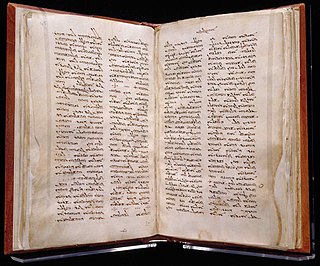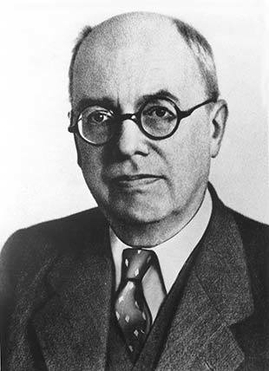
The Diatessaron is the most prominent early gospel harmony, and was created in the Syriac language by Tatian, an Assyrian early Christian apologist and ascetic. Tatian sought to combine all the textual material he found in the four gospels - Matthew, Mark, Luke, and John - into a single coherent narrative of Jesus's life and death. However, and in contradistinction to most later gospel harmonists, Tatian appears not to have been motivated by any aspiration to validate the four separate canonical gospel accounts; or to demonstrate that, as they stood, they could each be shown as being without inconsistency or error.

The Epistle to the Laodiceans is a letter of Paul the Apostle, the original existence of which is inferred from an instruction to the congregation in Colossae to send their letter to the believing community in Laodicea, and likewise obtain a copy of the letter "from Laodicea".
And when this letter has been read to you, see that it is also read before the church at Laodicea, and that you yourselves read the letter which will be forwarded from there.
Q.E.D. or QED is an initialism of the Latin phrase quod erat demonstrandum, meaning "which was to be demonstrated". Literally it states "what was to be shown". Traditionally, the abbreviation is placed at the end of mathematical proofs and philosophical arguments in print publications, to indicate that the proof or the argument is complete.

A loanword is a word at least partly assimilated from one language into another language. This is in contrast to cognates, which are words in two or more languages that are similar because they share an etymological origin; and calques, which involve translation. Loanwords from languages with different scripts are usually transliterated, but they are not translated. Additionally, loanwords may be adapted to the phonology, phonotactics, orthography, and morphology of the target language. When a loanword is fully adapted to the rules of the target language, it is distinguished from native words of the target language only by its origin. However, often the adaptation is incomplete, so loanwords may conserve specific features distinguishing them from native words of the target language: loaned phonemes and sound combinations, partial or total conserving of the original spelling, foreign plural or case forms or indeclinability.

OK is an English word denoting approval, acceptance, agreement, assent, acknowledgment, or a sign of indifference. OK is frequently used as a loanword in other languages. It has been described as the most frequently spoken or written word on the planet.
Ipso facto is a Latin phrase, directly translated as "by the fact itself", which means that a specific phenomenon is a direct consequence, a resultant effect, of the action in question, instead of being brought about by a previous action. It is a term of art used in philosophy, law, and science.

A sacred language, holy language or liturgical language is any language that is cultivated and used primarily for religious reasons by people who speak another, primary language in their daily lives.
Ruthenian is an exonymic linguonym for a closely related group of East Slavic linguistic varieties, particularly those spoken from the 15th to 18th centuries in the Grand Duchy of Lithuania and in East Slavic regions of the Polish–Lithuanian Commonwealth. Regional distribution of those varieties, both in their literary and vernacular forms, corresponded approximately to the territories of the modern states of Belarus and Ukraine. By the end of the 18th century, they gradually diverged into regional variants, which subsequently developed into the modern Belarusian, Ukrainian, and Rusyn languages.

Carpe diem is a Latin aphorism, usually translated "seize the day", taken from book 1 of the Roman poet Horace's work Odes.
The clausula was a newly composed section of discant inserted into a pre-existing setting of organum. Clausulae flourished in the late twelfth and thirteenth centuries and were associated with the Notre Dame school. The origin of the clausula has long been subject of scholarly debate, as the relationship between clausulae and motets is very complicated. Clausulae eventually became used as substitutes for passages of original plainchant. They occur as melismatic figures based on a single word or syllable within an organum.
A book review is a form of literary criticism in which a book is merely described or analyzed based on content, style, and merit. A book review may be a primary source, opinion piece, summary review or scholarly review. Books can be reviewed for printed periodicals, magazines and newspapers, as school work, or for book websites on the Internet. A book review's length may vary from a single paragraph to a substantial essay. Such a review may evaluate the book on the basis of personal taste. Reviewers may use the occasion of a book review for an extended essay that can be closely or loosely related to the subject of the book, or to promulgate their own ideas on the topic of a fiction or non-fiction work.

The Secretum or Secreta Secretorum, also known as the Sirr al-Asrar, is a pseudo-Aristotelian treatise which purports to be a letter from Aristotle to his student Alexander the Great on an encyclopedic range of topics, including statecraft, ethics, physiognomy, astrology, alchemy, magic, and medicine. The earliest extant editions claim to be based on a 9th-century Arabic translation of a Syriac translation of the lost Greek original. Modern scholarship finds it likely to have been a 10th-century work composed in Arabic. Translated into Latin in the mid-12th century, it was influential among European intellectuals during the High Middle Ages.
The American Council of Learned Societies (ACLS) is a private, nonprofit federation of 75 scholarly organizations in the humanities and related social sciences founded in 1919. It is best known for its fellowship competitions which provide a range of opportunities for scholars in the humanities and related social sciences at all career stages, from graduate students to distinguished professors to independent scholars, working with a number of disciplines and methodologies in the U.S. and abroad.

Ernst Robert Curtius was a German literary scholar, philologist, and Romance language literary critic, best known for his 1948 study Europäische Literatur und Lateinisches Mittelalter, translated in English as European Literature and the Latin Middle Ages.

The phrase "scientia potentia est" is a Latin aphorism meaning "knowledge is power", commonly attributed to Sir Francis Bacon. The expression "ipsa scientia potestas est" occurs in Bacon's Meditationes Sacrae (1597). The exact phrase "scientia potentia est" was written for the first time in the 1668 version of Leviathan by Thomas Hobbes, who was a secretary to Bacon as a young man.

The Syro-Aramaic Reading of the Koran: A Contribution to the Decoding of the Language of the Koran is an English-language edition (2007) of Die syro-aramäische Lesart des Koran: Ein Beitrag zur Entschlüsselung der Koransprache (2000) by Christoph Luxenberg.
Biblical minimalism, also known as the Copenhagen School because two of its most prominent figures taught at Copenhagen University, is a movement or trend in biblical scholarship that began in the 1990s with two main claims:
- that the Bible cannot be considered reliable evidence for what had happened in ancient Israel; and
- that "Israel" itself is a problematic subject for historical study.
Latinisationof names, also known as onomastic Latinisation, is the practice of rendering a non-Latin name in a modern Latin style. It is commonly found with historical proper names, including personal names and toponyms, and in the standard binomial nomenclature of the life sciences. It goes further than romanisation, which is the transliteration of a word to the Latin alphabet from another script. For authors writing in Latin, this change allows the name to function grammatically in a sentence through declension.

Sir Roger Aubrey Baskerville Mynors was an English classicist and medievalist who held the senior chairs of Latin at the universities of Oxford and Cambridge. A textual critic, he was an expert in the study of manuscripts and their role in the reconstruction of classical texts.
Disjecta membra, also written disiecta membra, is Latin for "scattered fragments" and is used to refer to surviving fragments of ancient poetry, manuscripts, and other literary or cultural objects, including even fragments of ancient pottery. It is derived from disiecti membra poetae, a phrase used by Horace, a Roman poet.










